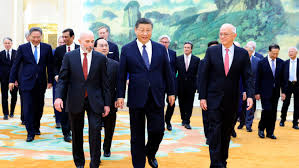China was the largest borrower from the World Bank for three decades leading up to 1994, investing in infrastructure such as electricity grids, roads, railways, as well as health and education systems.
Following this period, China shifted its focus to economic growth by funding domestic citizens in industrial initiatives. These rapid developments attracted foreign investors. On Monday, Chinese Foreign Minister Wang Yi and Vice Premier He Lifeng hosted a group of prominent American business leaders in Beijing for a week-long visit.
This influential delegation attended the third plenum of the US-China Business Council, aimed at enhancing relations and cooperation between the United States and China, the two largest economies worldwide. The delegation, led by Craig Allen, President of the US-China Business Council, included notable figures such as FedEx Corporation President and CEO Raj Subramaniam, Boeing Global Corporation CEO Brendan Nelson, and executives from Goldman Sachs, Micron, and Qualcomm, among others.
China’s policy emphasizes welcoming global political and business leaders to continue its deep reforms aimed at modernizing the economy. Foreign Minister Wang Yi stated, “China’s approach towards the United States has remained consistent and stable. We always seek to manage our relationship based on the principles of mutual respect, peaceful coexistence, and win-win cooperation.”
He further noted, “We are dedicated to enhancing cooperation with the United States, addressing differences, strengthening and expanding dialogue and cooperation, and striving to make China-US relations stable, sound and move forward,” Yi said.
Africa must learn. Scottish Adam Smith, the first known economist born in June 1723, said, “…the real tragedy of the poor is the poverty of their aspirations.”
Where your mind ends is where you end. African countries should set up research desks to call on African researchers to drop in suggested economic programs to boost the economies of each country.
Currently, the economics of Africa has no trajectory, limited to the borrowed knowledge of the Director-Generals, Permanent Secretaries, economists and accountants who accept His Masters Voice that all financial institutions and governments should not finance to start factories or other business operations, cutting out large pools of black people.
If nurtured to start, these are the businesses which will boost the economies, form business councils and grow the GDP from which to modernize the economy.
These are the people who will produce business executives. Contrary to this the president of South Africa is defending a court case brought by startups on this question, suggesting that the South African President agrees that black startups should not be funded. A startup is a business closest to starting.
What is happening in Kenya, Uganda, Mali, Niger, etc is a repeat of the Spring Revolution. China follows the right path chosen by the Chinese people.
What is the right path chosen by Zimbabwe, Malawi, Zambia, South Africa, Nigeria, Kenya, Ethiopia, and countries in West and East Africa? Why is Africa unable to generate enough electricity, provide water and build good roads, health facilities and education? What do we learn from China?
